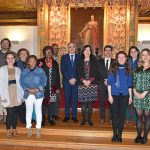The BantuFirst project is in search of a postdoctoral researcher in African Linguistics. Applications are invited here. Deadline for applications: October 11, 2020, 23:59 CET.
Category: Discipline
Sifra Van Acker obtains a fieldwork grant from Leopold III foundation
Sifra Van Acker has obtained a grant from the Leopold III-foundation for nature research and conservation to do fieldwork on names of useful plants in West-Coastal Bantu languages spoken in the vicinity of Idiofa (Kwilu Province, DRC). This fieldwork will contribute to her historical-linguistic research on subsistence in pre-colonial West-Coastal Bantu speech communities.
Sara Pacchiarotti obtains a three-year FWO senior post-doc grant
Sara Pacchiarotti obtained a three-year FWO senior post-doc grant for a research project titled “Directionality in morphosyntactic change: West-Coastal Bantu as a historical test case for linguistic theory“.
First published aDNA data from the DRC thanks to BantUGent excavations
A new interdisciplinary study published in the journal Science Advances reports on 20 newly sequenced ancient genomes from sub-Saharan Africa, including the first genomes from Botswana, Uganda and the Democratic Republic of Congo. These last data are foremost the result of archaeological research on the ancient kingdom of the Kongo during the ERC-funded KongoKing project. The new study contributes to a better comprehension of how diverse African societies with a diverse linguistic and cultural background interacted with each other during the Neolithicon and Iron Age. English, French and Dutch press releases are available.
Sara Pacchiarotti has a new book out
Sara Pacchiarotti, postdoctoral research within the BantuFirst project, has a new book out in the prestigious “Stanford Monographs in African Languages” series published by The University of Chicago Press. Its title is Bantu Applicative Constructions .
Job offer for a postdoctoral researcher in African Archaeology
The BantuFirst project is in search of a postdoctoral researcher in African Archaeology. Applications are invited here.
More than just words: A celebration of southern African languages on the occasion of the UNESCO Year of the Indigenous Languages
On November 11-13, 2019 Sara Pacchiarotti participated in the interdisciplinary conference “More than just words: A celebration of southern African languages on the occasion of the UNESCO Year of the Indigenous Languages” organized by Dr. Anne-Maria Fehn in close collaborations with African partners (San Research Center at the University of Botswana) and hosted at the CIBIO-InBIO lab in Vairão (Portugal). The conference brought together people from linguistics, cultural anthropology and the biological sciences, including speakers of Khoisan languages and Bantu languages from Botswana, Namibia and Angola, in order to highlight the importance of indigenous languages and indigenous knowledge in research and biodiversity conservation. Sara Pacchiarotti presented a talk in co-authorship with Koen Bostoen titled “Contact between non-Bantu speaking autochthonous hunter-gatherers and Bantu speakers in Central Africa: New linguistic insights from the BantuFirst Project”.
Heidi Goes presents her ongoing PhD research in Cabinda
On October 25, 2019, Heidi Goes had the opportunity to present some of her research on the Kikongo Language Cluster (a discrete branch within West-Coastal Bantu) at the first-ever conference on the languages of Cabinda in Cabinda. She was the only foreign participant and attracted quite some media attention, amongst others from Jornal de Angola (November 3 issue).
.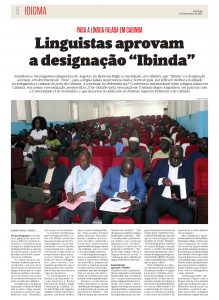
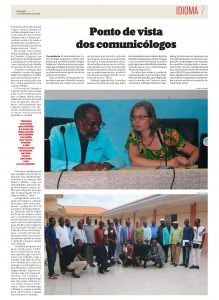
Prof. André Motingea Mangulu: “Particularités des langues mongo parlées par les groupes d’anciens chasseurs-collecteurs du bassin central congolais : Une contribution à la linguistique historique et à l’histoire des migrations”
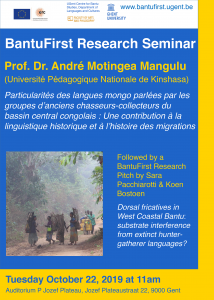 The BantuFirst project team is happy to invite you to its next research seminar, which will take place on October 22 at 11am at Ghent University (Auditorium P Jozef Plateau, Jozef Plateaustraat 22, 9000 Ghent).
The BantuFirst project team is happy to invite you to its next research seminar, which will take place on October 22 at 11am at Ghent University (Auditorium P Jozef Plateau, Jozef Plateaustraat 22, 9000 Ghent).
We have the honour to welcome Prof. André Motingea Mangulu (UPN Kinshasa) who will present a talk titled “Particularités des langues mongo parlées par les groupes d’anciens chasseurs-collecteurs du bassin central congolais : Une contribution à la linguistique historique et à l’histoire des migrations“.
His talk will be followed by a BantuFirst research pitch on “Dorsal fricatives in West Coastal Bantu: substrate interference from extinct hunter- gatherer languages?” presented by Sara Pacchiarotti.
Linguistic, archaeological, and genetic fieldwork in the Kwilu province (DRC)
From August 10 to September 11 2019, Sara Pacchiarotti and Koen Bostoen conducted, together with Prof. Léon Mundeke (Kinshasa University), Prof. Igor Matonda (Kinshasa University) and Isidore Nkanu Ntsasa, linguistic, archaeological, and genetic fieldwork in the DRC. The fieldwork’s main objective was to explore the area of the new WCB homeland, which Pacchiarotti et al. (2019) located somewhere in between the Kamtsha and Kasai Rivers in the current DRC province of the Kwilu (roughly -3.50, 19-20).
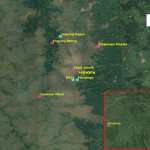
The initial goal was to reach the small towns of Panu (-3.79, 19.11) and Mangai (-4.02, 19.53), both located on the left bank of the Kasai River, approximately 600 kms northeast of Kinshasa (-4.32, 15.31). On our way to Panu, we stayed two days in Kikwit (-5.04, 18.81), where we started collecting genetic samples among university students at the Institut Supérieur Pédagogique in collaboration with Prof. Joseph Koni Muluwa. We then stopped in Idiofa (-4.96, 19.59) to split up the long journey. Our attempt to reach Panu and Mangai from Idiofa failed due to extremely poor road conditions and the impossibility to travel through hundreds of endless sandbanks with the vehicle we were using. As a consequence, the fieldwork team settled in Idiofa for approximately three weeks and conducted archaeological, linguistic and genetic fieldwork from this location.
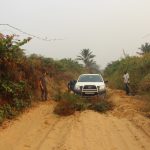


The archaeological fieldwork aimed at surveying and excavating in an area where excavations had never been conducted before in order to find datable traces of the first settlers and to start establishing a pottery-based cultural sequence. With the help of Isidore Nkanu Nsasa and local workers, Prof. Igor Matonda surveyed in Ingung Ateng (-4.89, 19.56), Impanga Mopila (-4.89, 19.65), Elom Idiofa (-4.96, 19.59), and Inswem Mbel (‑5.04, 19.51). He excavated in Ingung Kapia (-4.86, 19.56), Nkar (-4.98, 19.59), and Musanga (‑4.99, 19.58). He and his team excavated pottery from different time periods (both Early and Late Iron Age) in association with charcoal and iron slag. They also collected soil samples for future paleo-environmental research. In close connection to the archaeological fieldwork, an ethnographic survey was carried out on current-day pottery making in the village of Ingung Kapia. Prof. Léon Mundeke and Koen Bostoen videorecorded the entire chaîne opératoire and collected the specialized vocabulary related to the fashioning of pottery in Mbuun B87, the main Bantu language spoken in the area around Idiofa.
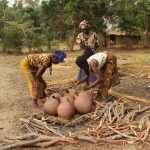
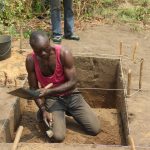
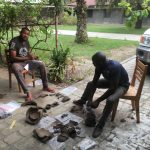
The linguistic fieldwork by Sara Pacchiarotti and Koen Bostoen primarily intended to collect data on Ngwi B861, a nearly undocumented and undescribed WCB variety spoken in several villages on the left bank of the Kasai River. Secondarily, we wanted to gather more lexical data on Lwel B862, spoken close to Ngwi B861, and on Mpe B821 and Nunu B822, two virtually unknown WCB languages spoken north of the Kwa River around the city of Mushie (-3.01, 16.92) and Nioki (-2.72, 17.69) in the Mai Ndombe Province. For Ngwi, we worked extensively with two consultants originally from Mangai but currently living in Idiofa, i.e. Mr. Fréderic Impenge Itobola and Mr. Eugene Marako Wosama. On the side, we also collected some lexical data on Lwel B862. Although we could not travel to Mushie or Nioki, once back in Kinshasa from Idiofa, we collected data on the noun class systems of Mpe and Nunu as well as novelty lexical data on these two unknown WCB varieties. Finally, we elicited extra data on the Teke variety Bwala B70z to fill in some gaps in the data that Flore Bollaert collected during her fieldwork in 2018 as part of her MA research.
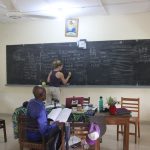
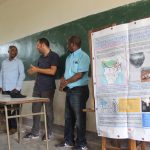
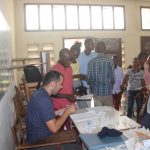
The genetic fieldwork aimed at collecting DNA samples from as many ethnolinguistic groups around the WCB homeland area as possible for further analysis at the Department of Organismal Biology at Uppsala University, under the supervision of Prof. Carina Schlebusch. The main goal is to get a better understanding of the population dynamics of the region’s ancestral Bantu-speaking populations and to detect possible admixture with autochthonous hunter-gatherers. We were able to collect 260 saliva samples from several different ethnolinguistic groups, mostly West-Coastal Bantu but also some Central Western and South Western Bantu. Prof. Léon Mundeke, Koen Bostoen and Sara Pacchiarotti conducted saliva sampling in Kikwit, Idiofa, Mangai, and Kinshasa.
